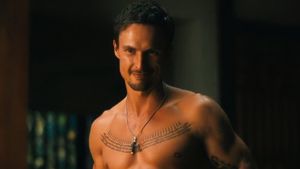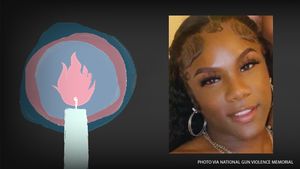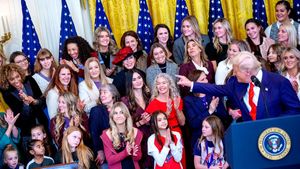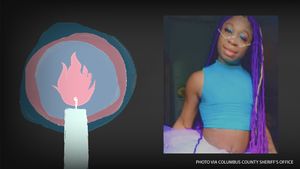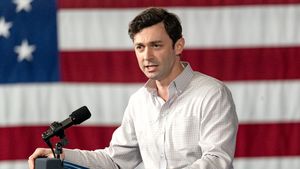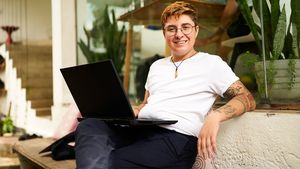When I tell people that my partner and I hadn't planned on having Delaney — my now-1-year-old daughter — I have to smile, because I realize I have some explaining to do. I mean, how exactly does a lesbian in a committed relationship accidentally get pregnant?
Well, it's actually quite a story. The highs and lows of what happened and the colorful, wacky characters who emerged couldn't have been dreamed up by the most imaginative soap opera writers in Hollywood. And the ending was absolutely the best part — miles away from what you might have expected from the tale's beginning (in an even longer story best saved for our memoirs).
It started like this: One evening, my much younger partner, Andrea, blurted out that she wanted to be a surrogate mother for our lesbian friends. I was surprised, but I understood. We'd spent the night listening to the couple tell us sad stories of their unsuccessful attempts to have a baby.
They'd already spent a quarter of a million dollars. Their eggs were "bad." They had participated in studies at Stanford. They were on waiting lists for adoption but kept getting rejected because they were gay.
Heartbreaking. I'd agreed with Andrea's assessment. But surrogating? We were in the midst of planning our dream wedding, and this would postpone it. This was, simply, huge.
Don't get me wrong: I knew Andrea was the rare type of woman who could make a baby for a worthy couple and then give it away. We already had a full house and we both we anxiously counted down the years, months, and days when we would be free of the responsibility of raising our own children. We dreamed of days to come when we could go on adult vacations, boating trips, and evenings out with our friends.
Still, with a little persuasion, I agreed to Andrea's surrogacy plans. It would only be one year out of our lives, right? Of course we would help our lesbian sisters make their dreams come true!
So we began trying to get Andrea pregnant. But we soon encountered a kink in the plan: Andrea had fertility problems of her own. Soon madcap doctors were getting involved without any concern for the money this was costing our friends. After four expensive attempts, we'd had enough: We would do this the old-fashioned lesbian way.
We got hold of a turkey baster, and our friends got hold of some fresh sperm, courtesy of their best friends (a gay couple with their own agenda). At this point, we felt like we were on Mr. Toad's Wild Ride at Disneyland and probably should have given up, but Andrea and I are no quitters, especially when it came to making our friends' dreams come true. Even after a failed first attempt, we resolved to try again.
Three frustrating, tear-jerking months later, we had finally done it: Andrea was pregnant! Celebrations and elation ensued. Baby names were being picked out and we began calling the baby "Peanut" until we knew its gender. Andrea and I were the heroes, the girls would finally be moms, and the donors would become uncles.
At least, that should have been the happy ending. But it wasn't the ending to be. This crazy journey's true trajectory still held a lot in store for me to learn about myself. Peanut would become my teacher, and I would be transformed.
Without this foresight, though, we went into a routine fetal medical check expecting to find nothing unusual: just the gender of the baby. When the doctor was through, he informed us that our friends were expecting a daughter. But this wasn't all he had learned: Peanut also had Down syndrome. He pushed for termination as he believed Peanut would die anyway. He offered to perform the abortion himself more than a few times.
We were all completely devastated.
The fact that we had gone through so much to make Peanut and she would have this abhorrent disability was completely unfathomable. Andrea entered a semicatatonic depression and the intended mothers — who, just hours before, had been celebrating — were trying not to have nervous breakdowns. They decided they wanted to terminate Peanut, which I knew would weigh heavily on Andrea. She left Peanut's fate entirely in my hands.
What should I do? I anguished.
What would you do?
You see, I was an admittedly selfish, middle-aged lesbian rock-and-roll singer with an overwhelming fear of disabled people. I felt repulsed by them and could relate to news stories of how children with Down syndrome were kicked off planes or asked to leave restaurants. I'm ashamed, now, to admit that I'd always thought, Why would these parents subject society to their real-life monsters?
But as I came to terms with Peanut's disability, I came to terms with something else: I loved her. I admired this little fighter. It was enlightening to discover a new depth to myself, a new clarity about the world around me, a new side to discrimination, especially my own. The monster wasn't Peanut: It was me. I was the monster all along.
Peanut deserved a chance at life, even if the doctors — and our two friends — didn't believe it.
Today, we are the proud mothers of a little overachiever who Andrea and I named Delaney Skye. She is a beautiful baby girl who continues to teach me that life is unexpected, to see the joys and simplest accomplishments, to see the world through new eyes. And I realize now that even though I can say we didn't intend to have a baby when we made Delaney, I can't say that she wasn't meant to be ours. Delaney knew better.
This is why, when international headlines erupted recently with the news of an Australian couple abandoning their baby with Down syndrome by leaving him with his Thai surrogate mother who'd refused to terminate, Andrea and I decided to begin speaking publicly about our experiences. Although we were as shocked by the Thai case as the rest of the world, we weren't surprised it happened. After all, it happened to us. Not in a developing country, but right here in the U.S.
What happens when a baby being carried by a surrogate is diagnosed with a disability? It opens up not only a moral but a legal can of worms. In order to raise awareness of the issues, I began writing and recently finished a memoir. But the Thai scandal prompted me to break my silence early, especially to our LGBT brothers and sisters.
As each state begins to legalize our marriages, our dreams of having families are becoming a normality. Using surrogates for our community is becoming more and more standard. We need to ask ourselves and be honest: What would we do if that child was born inherently "different" from the majority?
KESTON OTT-DAHL lives in the San Francisco Bay area with her partner, three children, two dogs, and a cat. She is the author of the upcoming memoir Delaney Skye and is currently working on her follow-up memoir, We're Not in Kansas Anymore, Delaney.





































































































